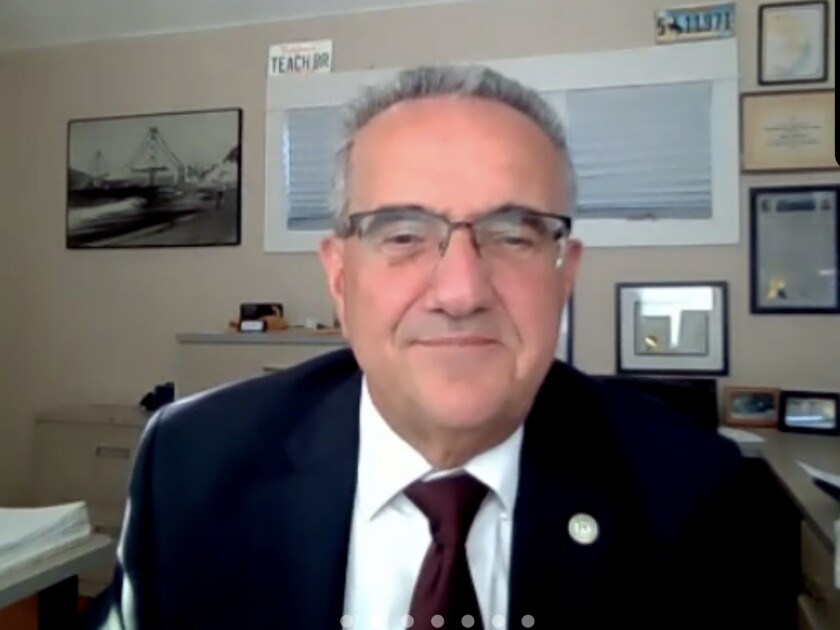With a UC San Diego expert forecasting flooding in La Jolla with nearly every high tide by the end of the century, San Diego City Councilman Joe LaCava said battling climate change, and specifically local sea-level rise, will take an approach combining “science, collaboration and grassroots advocacy.”
LaCava, whose District 1 includes La Jolla, presented a webinar May 3 titled “Sea Level Rise: Reason & Resilience.” Three local experts weighed in on the issue, describing its impacts and how communities can participate in the fight against it.
Mark Merrifield, director of the Center for Climate Change Impacts and Adaptation at UCSD’s Scripps Institution of Oceanography, said the problem is driven by the increase of carbon dioxide in the atmosphere, which has resulted in an “unprecedented” increase in global surface temperature.
Carbon dioxide is “definitely a beneficial gas and we rely on it for our survival,” Merrifield said, “but too much of a good thing is not necessarily all good,” as the increase in the gas is trapping heat on Earth, primarily in the ocean, causing ice caps to melt and ocean levels to rise.
The rate of sea-level rise in San Diego is faster than the global rate, Merrifield said, because “land in our region is going down a little bit, so we’re sinking. As the ground sinks, the water looks like it’s going up faster.”
Currently, sea-level rise is measured at 10 inches locally, he said, with projections that by “the end of 2100, we should see something like a 1- to maybe 3.6-foot rise in sea level.” By the 2030s, the region will experience more high-tide flooding, he said.
“We’ll be in a very, very rapidly changing situation where nearly every high tide … by the end of the century will lead to a flooding event,” he said. “That will include La Jolla.”
Short-term options for shoreline protection often involve “beach nourishment,” a process in which large amounts of sand are added to eroding beaches, Merrifield said. He showed photos of that being done at Torrey Pines State Beach.
He said another way to counteract erosion and flooding is a “heavily engineered berm,” or raised strip of land that serves as a barrier against waves and wind, with a drainage system.
“The hope is that these … natural approaches will be beneficial and will provide some protection for the immediate future,” Merrifield said.
He said his team also is using light detection and ranging, or Lidar, measurements to map changes in cliff heights to “provide some heads up of when a bluff or a cliff is likely to collapse,” especially during heavy rains.
“For our county, the stability of our cliffs is an important consideration, certainly something to worry about with sea-level rise,” he said.
Laura Walsh, policy coordinator for Surfrider Foundation San Diego County, said most of her work is related to sea-level rise “because of the realization that we can’t protect something if it no longer exists.”

San Diego City Councilman Joe LaCava says fighting sea-level rise will require a combination of “science, collaboration and grassroots advocacy.”
(Elisabeth Frausto)
Development of coastal areas has led to a need “for strategies to protect the ocean,” Walsh said, which involve “managed retreat,” an option for action along with protection and adaptation strategies.
Protection strategies include construction of sea walls, or “armoring” techniques, which she said can accelerate erosion by deflecting wave energy. “That’s not something naturalists want to see.”
Adaptation can involve the beach nourishment that Merrifield discussed, which in some ways is “a Band-Aid solution,” Walsh said. “We’re not going to be able to dump sand on the beach forever.”
Managed retreat to combat sea-level rise is when communities “make room for the coast,” Walsh said, such as methodically moving train tracks or homes further off the coast. “It doesn’t happen overnight,” she said.
Managed retreat “isn’t one size fits all,” she said, “but in certain scenarios, [it] can be very valuable.”
Darbi Berry, program manager for the San Diego Regional Climate Collaborative, said her organization “envisions a region that is prosperous and resilient.”
The Climate Collaborative works to support coastal resilience by running “a working group of about 50 individuals across the region” on the topic, she said. It conducts, in addition to other programs, “a legal risk analysis for adaptation strategies” as part of a 2017 project funded by the National Oceanic and Atmospheric Administration.
Building coastal resilience benefits from a regional approach in which various communities pool their expertise and streamline “guidance for navigating different regulatory policies,” Berry said.
“One thing that we really work on is how do we think about the coastline as a full region. You’re not just responsible for the beaches that are in your neighborhood, but we’re also responsible for understanding those impacts both up and downstream,” she said.
Berry said her organization is concerned about “the cost of inaction. … What is the cost to us long-term as a city to not making these changes to our beaches? The data show it’s going to cost a lot over a long period of time if we don’t act now.”
LaCava said “failing to recognize and address climate change and sea-level rise is no longer an option for our region. We cannot hesitate. We must achieve our Climate Action Plan and climate equity goals, prepare our city for climate impacts and meet environmental mandates. Our city’s health, safety and economic vitality depend on it.”
San Diego’s Climate Action Plan, approved in 2015, calls for, among other things, eliminating half of all greenhouse gas emissions in the city and for all local electricity to be from renewable sources by 2035. ◆
"local" - Google News
May 08, 2021 at 03:48AM
https://ift.tt/3erGTMB
'We cannot hesitate': Experts at councilman's webinar take on local sea-level rise - La Jolla Light
"local" - Google News
https://ift.tt/2WoMCc3
https://ift.tt/2KVQLik
Bagikan Berita Ini














0 Response to "'We cannot hesitate': Experts at councilman's webinar take on local sea-level rise - La Jolla Light"
Post a Comment